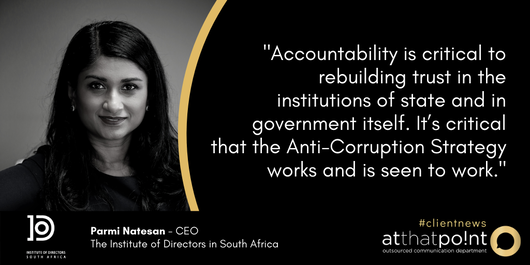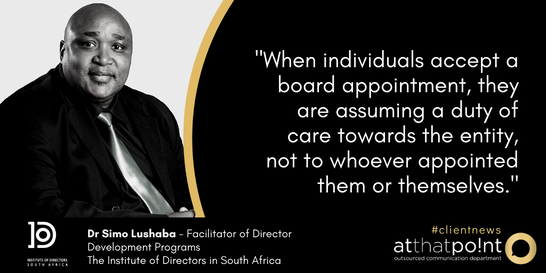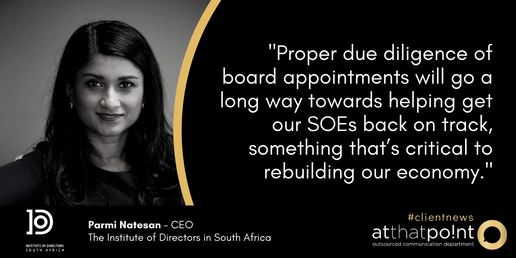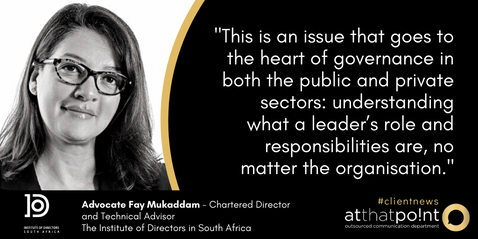|
In his recent State of the Nation Address, President Ramaphosa emphasised the deep negative impact of corruption on the country’s growth and development, with specific reference to the shocking revelations emerging from the Zondo Commission. The President noted that good progress had been made in rebuilding the law-enforcement bodies, and the implementation of a National Anti-Corruption Strategy.
“South Africans need no reminding that corruption is a cancer that is destroying the fabric of our society, and the recent scandals relating to the procurement of personal protective equipment have driven home how brazen the looting has become. But, at the same time, society is cynical about government’s political will truly to bring malefactors to book,” argues Parmi Natesan, CEO of the Institute of Directors in South Africa (IoDSA). “Accountability is critical to rebuilding trust in the institutions of state and in government itself. It’s critical that the Anti-Corruption Strategy works and is seen to work.” The IoDSA urges that government needs to consider the following in order to ensure its anti-corruption strategy actually works: Is it well designed? “It’s important the programme is aligned with legal requirements and stakeholder expectations—it must deliver accountability in line with what long-suffering citizens want,” she explains. “Equally important, the programme must focus on the key risks to ensure maximum impact, and its results must be rigorously measured and reported. Transparency is the twin sister of ethics and accountability.” Is it being applied in good faith? With the greatest respect, it is easy to set up initiatives but only few actually deliver. Adequate resourcing and a record of swift action taken against corrupt individuals indicate good faith. It must also be clear that initiatives are in place to make ethical behaviour the default setting across government. These would include a visible commitment to ethical behaviour at the highest echelons of government, comprehensive training throughout the organisation and a well-communicated anti-corruption policy. In a sense, government is the board of South Africa Inc, and so is responsible for setting the “tone at the top” and driving it down throughout the country. Does it work? Any programme is only so good as its results. Government must commit to actively monitoring how well its anti-corruption programme is working based on a consistent set of metrics, one of which should be the incidence of corruption both in terms of value and number of incidents. “Government needs to ensure not only that that monitoring takes place, but that it reviews the results regularly to identify and remediate any gaps,” Ms Natesan notes. It’s worth reminding ourselves of how serious the consequences of corruption and unethical practices are. They include lack of societal service delivery, and reputational damage to the country and the government, as well as their leaders. From a governance perspective, corruption is essentially the opposite of good corporate governance i.e. ethical and effective leadership. “A corrupt country will find it hard to attract foreign direct investment, inhibiting the growth of a tax base government can use to fund social-upliftment projects. Civil claims by parties who suffered loss as a result of corruption are also a possibility,” Ms Natesan concludes. “Of course, individuals convicted of corruption could face criminal charges as well.” ENDS MEDIA CONTACT: Stephné du Toit, 084 587 9933, [email protected], www.atthatpoint.co.za For more information on the IoDSA please visit: Website: www.iodsa.co.za Twitter: @The_IoDSA LinkedIn: Institute of Directors in South Africa Company Page
0 Comments
Testimony at the Zondo Commission relating to the prepayment of R1.68 billion to Tegeta, a company owned by the Gupta family, provoked strong words from Deputy Chief Justice Raymond Zondo.[1] Dr Simo Lushaba, Facilitator of Director Development Programmes at the Institute of Directors in South Africa (IoDSA), says the whole incident illustrates how seriously directors should approach their duties.
“Justice Zondo suggested that the directors were negligent at best. If we take that line of thought to its logical conclusion, they could be at risk of being sued for damages in their personal capacities,” he says. “Directors need to accept that theirs is a very serious job and that the stakes are high. Their only protection against decisions that are proved to be wrong is that they did discharge their duty of care, and made decisions based on a thorough examination of the facts and in the best interests of the company.” Dr Lushaba pinpoints the lessons for directors as follows: Understand your primary duty as a director. When individuals accept a board appointment, they are assuming a duty of care towards the entity, not to whoever appointed them or themselves. Their actions and decisions have to be guided by the interests of the company and its stakeholders. Apply your mind and ask the right questions. In this case, the trigger phrase was “proposed owners”, which should have prompted directors to question why money for a commodity was not being paid to the existing owners. “In any event, you don’t buy something from the owner of the store, you buy it from the store itself,” he comments. “The most basic question was never asked—who owns the coal and why aren’t we paying them?” Dr Lushaba emphasises that one of the primary duties of a board member is to ask questions and that there is no such thing as a stupid question. Directors are under an obligation to apply their minds to whatever is before them and to adopt a stance one might call “professional scepticism”. Be courageous in discharging your duty of care. The fact that no directors dissented when approving this prepayment to “proposed owners” indicates that the board dynamics were out of tune. Directors must have the courage not only to ask tough questions but to dissent when a decision they believe to be wrong is adopted—a good director is an independent thinker. An important corollary is the importance of diversity. Boards will not generate the necessary quality of questioning if they do not contain individuals with different backgrounds, experience and skills. A board is a collection of individuals, not a group and, crucially, directors are held individually responsible for the board’s actions. Understand the interplay between risk and opportunity. One of the then-directors attempted to portray the board’s action as an effort to secure the supply of a necessary raw material. However, what seemed to be an opportunity hid considerable risk. The same point could be made about risks. “One of a board’s key jobs is to understand the risks the organisation faces and protect it from them,” Dr Lushaba concludes. “Directors cannot just look at opportunities.” [1] News24Wire, “Zondo blasts 'negligent' former Eskom board over R1.68bn prepayment to Gupta entity”, Engineering News (11 February 2021), available at https://www.engineeringnews.co.za/article/zondo-blasts-negligent-former-eskom-board-over-r168bn-prepayment-to-gupta-entity-2021-02-11/rep_id:4136. ENDS MEDIA CONTACT: Stephné du Toit, 084 587 9933, [email protected], www.atthatpoint.co.za For more information on the IoDSA please visit: Website: www.iodsa.co.za Twitter: @The_IoDSA LinkedIn: Institute of Directors in South Africa Company Page The Institute of Directors in South Africa (IoDSA) welcomes the President’s emphasis in his State of the Nation Address on the need for competent individuals to be appointed in the civil service. The President argued that professional civil servants were vital in ensuring effective service delivery and restoring public confidence in the government. However, says Parmi Natesan, CEO of IoDSA, there is an equal need for professionalism on the boards of state-owned enterprises (SOEs) which deliver critical services to citizens and the economy as a whole.
“President Ramaphosa repeatedly emphasised the need for well-trained, professional civil servants and ‘capable, experienced and trustworthy professionals’ in order to ensure effective service delivery,” she says. “But when it comes to board appointments at the SOEs, we have experienced that there is considerable room for improvement. We have frequently seen political appointees failing the organisation—much of what is emerging at the Zondo Commission can be traced to inappropriate board appointments. “Proper due diligence of board appointments will go a long way towards helping get our SOEs back on track, something that’s critical to rebuilding our economy.” Given the vital role played by non-executive directors, the IoDSA has long promoted the need for creating a deep pool of professional directors whose competencies are objectively certified and who subscribe to a code of professional ethics. In this regard, the IoDSA introduced the Certified Director and Chartered Director destinations that provide a framework through which directors can acquire the necessary competencies, and demonstrate that they have them. The IoDSA’s Director Competency Framework allows directors and would-be directors to acquire the skills they need to add value to the boards on which they sit. Holders of these designations also have to commit to lifelong education to ensure that they keep up with developments in the field of directorship, and that their existing skills are kept current and that they acquire new ones as necessary. “Directorship is a professional like any other, and there is an urgent need to have a way of ensuring that only individuals with the right skills (professional and personal) and ethics are appointed to boards, including SOE boards,” she says. “Professional directors can also be held to account by their professional body and disciplined for deviating from the Code of Conduct they signed up to, making accountability much easier to enforce.” ENDS MEDIA CONTACT: Stephné du Toit, 084 587 9933, [email protected], www.atthatpoint.co.za For more information on the IoDSA please visit: Website: www.iodsa.co.za Twitter: @The_IoDSA LinkedIn: Institute of Directors in South Africa Company Page The testimony of Dikeledi Magadzi, Deputy Minister of Transport, at the Zondo Commission has highlighted the fact that many in Parliament do not fully understand their role and responsibilities, says Advocate Fay Mukaddam, Chartered Director and Technical Advisor at the Institute of Directors in South Africa (IoDSA).
Ms Magadzi’s testimony concerned events in 2016 when she was chair of the Portfolio Committee on Transport. At the time, it was alleged that a R51 billion Passenger Rail Agency of South Africa (PRASA) tender had been rigged. Under her watch, the ANC members of the committee quashed a proposed investigation. During the same period, ANC MPs were instructed to vote against a parliamentary motion to investigate the Guptas and state capture. Her justification for these actions was that she sat in Parliament only as a member of the ANC: I’m not in Parliament as myself, I represent the African National Congress, and will always ensure that I toe the party line, and that is what I did.” Even more tellingly, she said that even knowing what she knows now about the Guptas and state capture, she still believes that what the party instructed its cadres to do was “correct”.[1] “Ms Magadzi is not an outlier. Many in Parliament simply do not fully understand the role they have to play,” Advocate Mukaddam says. “This is an issue that goes to the heart of governance in both the public and private sectors: understanding what a leader’s role and responsibilities are, no matter the organisation.” The problem is common in companies, where directors frequently see their role as one of advancing the interests of the stakeholder groups they represent. This a mistaken understanding, Advocate Mukaddam argues. “No matter how they are appointed, directors have a duty to act in the best interests of the entity itself, and nobody else. Only then are they able to fulfil their real purpose: exercising oversight over the executive and helping the organisation achieve its stated goals,” she says. “In many ways, Parliament constitutes the board of directors of South Africa Inc, with its committees playing a similar role in respect of various state-owned entities. No matter who puts them in Parliament, MPs and members of oversight committees have a primary allegiance to the country and its citizens as a whole.” While a far-reaching reform of the electoral system is probably going to be necessary in the long term, she continues, we must focus now on educating our parliamentarians on the basics of governance and what their roles and responsibilities are. “In effect, we need Governance 101, with the King Report as the essential guide,” she says. “We don’t need new frameworks or position papers—we already have everything we need. We must implement what we have and ensure that those that fall short suffer the consequences.” [1] Jan Gerber, “’I represent the ANC, and I will always toe the party line’—Magadzi tells Zondo Commission”, News24 (8 February 2021), available at https://www.news24.com/news24/southafrica/news/i-represent-the-anc-and-i-will-always-toe-the-party-line-magadzi-tells-zondo-commission-20210208. ENDS MEDIA CONTACT: Stephné du Toit, 084 587 9933, [email protected], www.atthatpoint.co.za For more information on the IoDSA please visit: Website: www.iodsa.co.za Twitter: @The_IoDSA LinkedIn: Institute of Directors in South Africa Company Page |
Archives
July 2024
Categories
All
|





 RSS Feed
RSS Feed